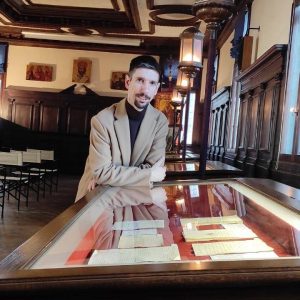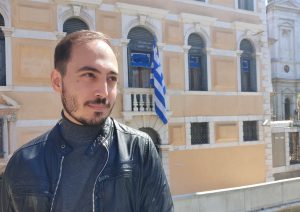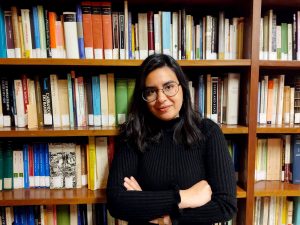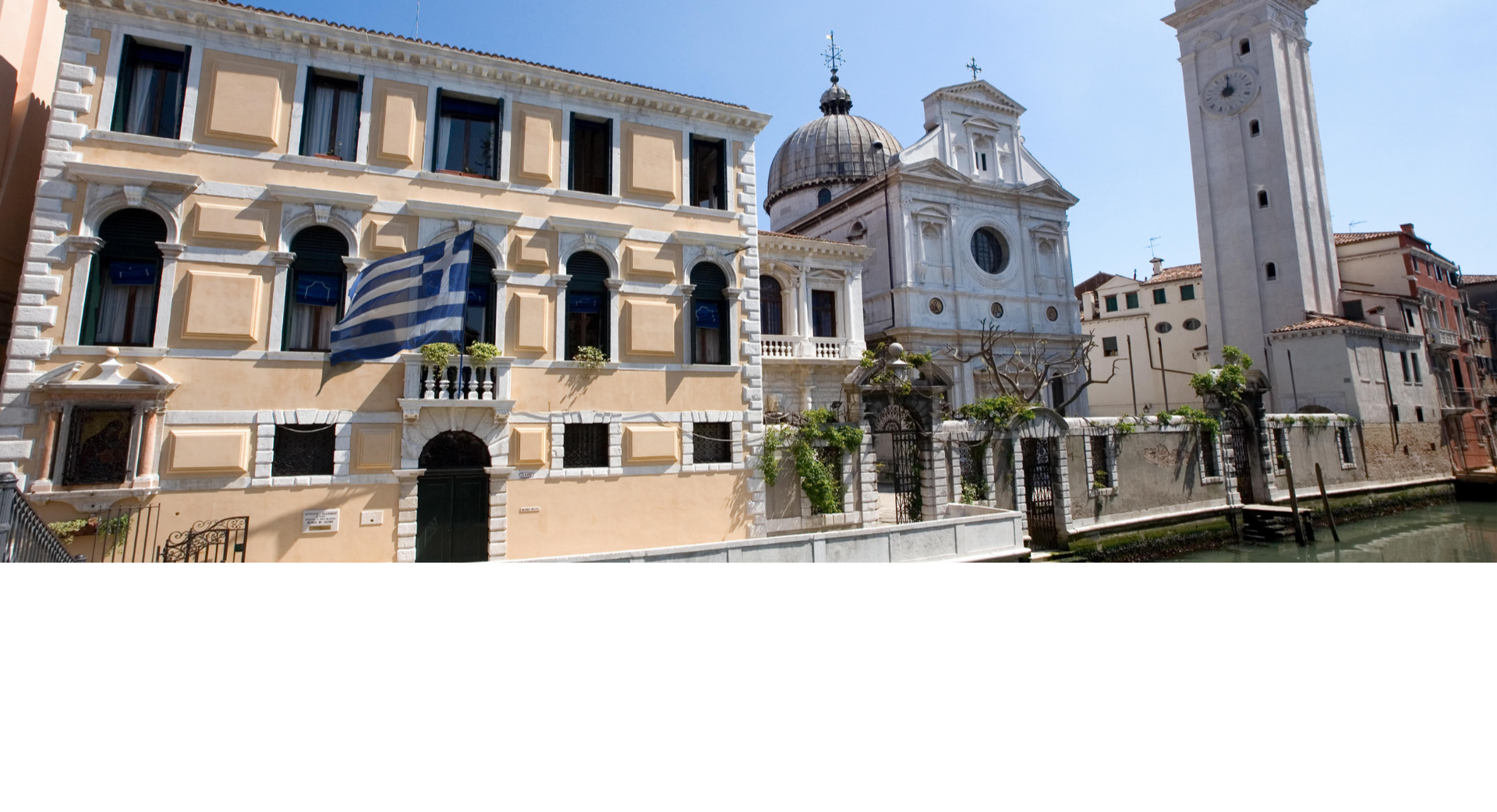
Research Fellows Researchers
Dimitrios Roumbecas is Dr. of Ancient Greek Philology and Papyrology at the National and Kapodistrian University of Athens. He holds a BA in Classical Philology and Papyrology and a Master’s degree in Classics from the University of Ioannina. His PhD thesis is entitled “The health system in Greco-Roman and Byzantine Egypt in the light of the papyri” and is due to be published soon. His research interests include issues of editing, language and interpretation in the study of literary and non-literary papyri, ancient Greek and Byzantine medical literature, as well as more specific topics related to disease and treatment in the Greco-Roman world and in late antiquity.
During her research at the Hellenic Institute of Byzantine and Post-Byzantine Studies in Venice, she studies the cult of the healing saints in Byzantine Egypt in the light of hagiological, papyrus and epigraphic sources. It focuses on the forms of worship of the healing saints (ascetics, martyrs, archangels) in the land of the Nile, in the period from the third to the eighth century: prayers, amulets, oracular texts, hymns and eulogies, temples, monasteries and charitable institutions dedicated to healing saints or saints associated with the care of the poor and distressed, as well as sacred icons, dedications and festivals in honour of healing saints.
Dimitrios Roumpekas, “The xenodocheion of Saint Ioustus at Oxyrhynchus”, Medioevo Greco 22 (2022). [under publication]
Dimitrios Roumpekas, “Ὠιὸν δίδυμον (P. Cair. Zen. IV 59602, IIIa, Philadephia): Some remarks”, Analecta Papyrologica 33 (2021). [under publication]


Angelos Zaloumis is a PhD candidate in Byzantine philology and philosophy at the University of Patras and the École Pratique des Hautes Études PSL in France. The subject of his doctoral research is the critical edition of the Greek translation of the Summa Theologiae of Thomas Aquinas (1224/25 – 1274) by Demetrius Kydonis (c. 1320/25 – 1397/98).
From September 2021 he is a research fellow at the Hellenic Institute of Byzantine and Post-Byzantine Studies in Venice. His research concerns the study of aspects of Byzantine Thomism as well as the reception of the translation of Demetrius Kydoni in late Byzantium and the special ethics of Thomas Aquinas, as reflected in particular in the works of Gennadius Scholarios.
Zaloumis A., «Thomas Aquinas’ Summa contra Gentiles as the Source of the Moral Intellectualism in John VI Cantacuzenus’ Contra Mahometem Disputatio ΙΙ (Κατὰ τοῡ Μωάμεθ λόγος δεύτερος)», Tasting the Lotus’: Reception of and Reaction to the Transmission of Latin Works in Byzantium, (Online conference, 31.07 – 01.08.2021).
Zaloumis A., «Demetrios Kydones’ Greek Rendering of Aristotelian Ethical Terms in Thomas Aquinas’ Summatheologiae, IIaIIae», International Conference Translation Activity in Late Byzantium (Ca’ Foscari University of Venice, 11 – 13.06.2018).
Ζαλούμης Ά., «Το ιδεώδες της ελευθερίας της θρησκευτικής συνείδησης στο αυτοβιογραφικό έργο του Δημήτριου Κυδώνη (περ. 1325 – 1397/8)», Ημερίδα Ξεφυλλίζοντας το Βυζάντιο ΙΙ: Χειρόγραφα, Κείμενα, Ιδέες (Πανεπιστήμιο Πατρών, 05.05.2014).
Zaloumis A., «Demetrios Kydones’ Greek Rendering of Aristotelian Ethical Terms in Thomas Aquinas’ Summatheologiae, IIaIIae», Translation Activity in LateByzantium: An International Conference (11-13.06.2018). [υπόέκδοση: Byzantinisches Archiv – Series Philosophica, vol. 4, Berlin/Boston, De Gruyter]


Mariolena Alexiadis is a graduate of Greek Literature at the National and Kapodistrian University of Athens, specializing in Classical Studies. In 2018, she received her Master’s degree from the Department of Social Theology and Christian Culture of the Aristotle University of Thessaloniki, with a grade of “excellent”. Her thesis dealt with the policy of the Roman Empire towards Christians in the 3rd century.
She is a doctoral candidate at the School of Education of the University of Crete. In her thesis she studies the Neon Limonary (Venice, 1819) from a historical-philological, theological and pedagogical perspective.
Mariolena Alexiadis is a research fellow of the Hellenic Institute of Byzantine and Post-Byzantine Studies in Venice, for the year 2021-2022. She works mainly at the Marcian Library of Venice. In particular, he studies manuscripts of hymnological and hagiological content (martyrdoms, scriptures, praise, narratives of miracles), comparing them with similar material from the Vatican Apostolic Library. Its aim is to gather information on the worship and miracles of the saints included in the Neon Lectionary, to examine variants of their Lives and to identify the sources of the work. More, she is researching versions of the work and the cultic aspect of hagiology in the Venetian world in general.
Αλεξιάδη Μ., Η πολιτική της Ρωμαϊκής Αυτοκρατορίας έναντι των Χριστιανών κατά τον 3ο αιώνα, Θεσσαλονίκη 2020.
Αλεξιάδη Μ., «Η διάδοση του Χριστιανισμού στην Κύπρο κατά τη ρωμαϊκή κυριαρχία στη νήσο», στο: Α. Μαστραπάς, Μ. Στεργιούλης (επιμ.), Πρακτικά 45ου Ετήσιου Συνεδρίου Κύπρος: Ιστορία και Πολιτισμός, (Σεμινάριο Πανελλήνιας Ένωσης Φιλολόγων – Σύνδεσμος Ελλήνων Κυπρίων Φιλολόγων (Αθήνα, 8-10 Νοεμβρίου 2018), τόμος Α΄, Αθήνα 2022.


Panagiotis Makris is a PhD candidate in Byzantine History at the Department of History of the Ionian University. His doctoral research examines the concept of the body and the conception of illness, healing and death in late Byzantine scholars (1204-1453). His academic interests are particularly oriented towards the social and cultural history of the Byzantine world.
Panagiotis Makris is a research fellow at the Hellenic Institute of Byzantine and Post-Byzantine Studies in Venice. His research is entitled ‘A Byzantine scholar in the years of the plague: illness and death in the work of Demetrius Kydoni (1324-1397)’. It is part of the conceptual history of 14th-century Byzantium. His research aims to investigate the reception and semantic realisation of the concepts of ‘illness’, ‘healing’ and ‘death’ by the Byzantine scholar and official Demetrius Kydoni (1324-1397), but at the same time it expands into a global approach to all the ideological nuances and social perceptions associated with them. The research is part of the broader scientific field of Byzantine Studies and in particular in the context of the study of attitudes during the Palaeologan Renaissance.
Makris Panagiotis, “The reception of the plague of 1347-1348 by the society of Constantinople. A psychosocial approach to the sources of the period”, Byzantine Doctrine 30(2022).


Argyro Ganali is a PhD candidate in History at the Department of History and Archaeology of the Faculty of Philosophy of the National and Kapodistrian University of Athens. Her doctoral thesis examines the wide range of relations between Venice and the representatives of the Latin Church in Crete in the first half of the 17th century and specifically after the Interdetto (1606), which was the culmination of the conflict between the two states during the early modern period.
During the academic year 2021-2022, Argyro Ganalis is a research fellow at the Hellenic Institute of Byzantine and Post-Byzantine Studies in Venice. Her thesis is entitled “Relations between State and Church in Venetian Crete after the Interdetto: the state supervision of church property”. She discusses the state supervision over the Orthodox and Latin public law foundations (ius patronato pubblico) and the activities of the latter vis-à-vis the state, such as the provision of monetary donations, information on Ottoman movements that constituted a danger to Venice’s interests in the East and especially in the acquisition of Crete. He is studying unpublished archival material in the Archivio di Stato di Venezia. Her research covers the period 1620-1640.


Visiting Researchers
The subject of the research or cooperation concerns issues of history, philology, theology, art history and related humanities disciplines during the Byzantine and post-Byzantine period. Each request for hosting must be submitted within the time limit and be accompanied by the relevant supporting documents. The relevant submission forms are available on the Institute’s website and, once carefully completed, must be submitted electronically to the Institute’s Secretariat.
The application includes a documented description of the research, the data to be searched in the libraries and archives of Venice, and the time planned for carrying out the research. In particular, postgraduate students and doctoral candidates must also submit a letter of recommendation from their supervisor, stating the objectives of the research to be carried out.
Another category of researchers are those hosted by the Institute of Byzantine and Post-Byzantine Studies in Venice at their request, to conduct research in the Venetian archives and libraries. The number of these researchers is small, due to the limited number of rooms and guesthouses available at the Institute.
Visiting researchers shall pay the fee for each overnight stay provided for in the relevant Regulations upon arrival in Venice. This amount covers the maintenance and cleaning of the rooms.
At the end of their stay, guests shall submit a detailed report to the Institute’s Secretariat. They must then send a copy of their completed work (articles, studies, independent papers) for the Institute’s Library.


